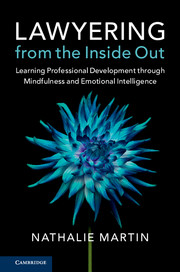 Lawyering from the Inside Out
Lawyering from the Inside Out from PART II - YOU AND OTHERS AROUND YOU
Published online by Cambridge University Press: 18 May 2018
This being human is a guest house
Every morning a new arrival.
A joy, a depression, a meanness,
some momentary awareness comes
as an unexpected visitor.
Welcome and entertain them all!
Even if they are a crowd of sorrows,
who violently sweep your house
empty of its furniture,
still treat each guest honorably.
He may be clearing you out for some new delight.
The dark thought, the shame, the malice,
meet them at the door laughing,
and invite them in.
Be grateful for whoever comes,
because each has been sent
as a guide from beyond.
RumiThe Sufi poet Rumi states the truth when he says that “this being human is a guest house.” We need to experience and welcome the full range of emotions if we are to truly live. In this chapter, we discuss some of the most complex emotional intelligence skills, including processing emotions, practicing nonjudgment, dealing with difficult people, and forgiving others. Everyone who is fully alive struggles with these issues. Indeed, many of the authors who share advice on these subjects admit that they write about these topics because the issues challenge them. Many of the world's greatest leaders exhibit these advanced emotional intelligence skills, while at the same time struggling with them. I guess that means, just like the rest of us, they are human.
As in the last chapter, it is helpful to see difficult situations as opportunities. We now turn to the topics of practicing nonjudgment, processing our emotions, dealing with difficult people, and forgiveness. Like the subjects of Chapter 9, these skills build on one another, in roughly the order in which they are presented here.
LEARNING TO RECOGNIZE AND PRACTICE NONJUDGMENT
What is love?
Love is the absence of judgment.
Dalai Lama
LAW PAUSE
Think of a time when someone judged you and the person was incorrect about that judgment. What made the person judge, and did he or she find out that the judgment was incorrect? How?
Now think of a time you incorrectly judged someone. How did you find out the judgment was incorrect?
To save this book to your Kindle, first ensure no-reply@cambridge.org is added to your Approved Personal Document E-mail List under your Personal Document Settings on the Manage Your Content and Devices page of your Amazon account. Then enter the ‘name’ part of your Kindle email address below. Find out more about saving to your Kindle.
Note you can select to save to either the @free.kindle.com or @kindle.com variations. ‘@free.kindle.com’ emails are free but can only be saved to your device when it is connected to wi-fi. ‘@kindle.com’ emails can be delivered even when you are not connected to wi-fi, but note that service fees apply.
Find out more about the Kindle Personal Document Service.
To save content items to your account, please confirm that you agree to abide by our usage policies. If this is the first time you use this feature, you will be asked to authorise Cambridge Core to connect with your account. Find out more about saving content to Dropbox.
To save content items to your account, please confirm that you agree to abide by our usage policies. If this is the first time you use this feature, you will be asked to authorise Cambridge Core to connect with your account. Find out more about saving content to Google Drive.